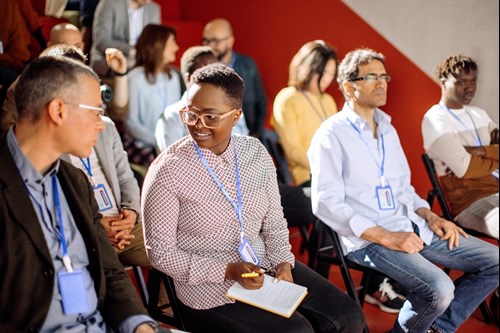The ins and outs of teacher research
How often do you reflect on why things are working in your classroom, and what makes them effective? Do we just go on instinct, or is there space for research? Chiara Bruzzano lifts the lid on teacher research and explores how it is defined, then investigates the different forms of teacher research, why you may want to try it and some barriers to it.

In my life as an academic, teacher and trainer, I have had the privilege to attend a fair few conferences and networking events. But the one that probably resonated with me the most, as someone that has always felt in a limbo between teaching practice and research, is the ELT Research in Action conference. For the record, it was not only the amazing tapas buffet on a Barcelona rooftop that won my heart (although I can’t say I don’t remember it fondly even after four years ...), but the main question underlying the whole event: how do we bridge the gap between research and practice in ELT?
This is a huge question and one possible answer is teacher research. The current Modern English Teacher issue is all about classroom research, so I thought I would add my two cents about what teacher research is, various types of teacher research, why you might want to do it and some potential problems with it.
Teachers engaging with research
Studies like Marsden and Kasprowicz (2017) and Borg (2010) about teachers’ engagement with academic research seem fairly conclusive: practising teachers do not read a lot of published academic research. This is due, among other things, to a lack of time as well as physical and intellectual inaccessibility.
This prompts two important questions. The first is whose responsibility it is to make sure that teachers can access this research: is it the teachers’, the academics’ or someone else entirely (e.g. heads of department, ministries of education)? I strongly disagree with the view that it is primarily the teachers’ obligation ‘to understand the importance of, and to apply correctly, the findings [that researchers] have so meticulously generated’ (Barone 1995:1). Indeed, most people would now agree that academic researchers themselves have to be involved in disseminating the results of their research in a way that is accessible to different kinds of practitioners – hence the existence of conferences like ELTRIA.

This leads me to the second question: how useful is this published research anyway? Again, for the most part we have thankfully moved away from a top-down view of research dissemination towards a more nuanced perspective that recognises that the applicability of research findings can be limited and that teachers themselves have to critically evaluate what can and cannot work in their contexts.
Merging teaching and research
What is traditionally known as academic research is normally published in journals, it relies on accepted methodologies and it does not always have practical classroom implications. Having established that this sort of research does not always reach teachers and even when it does, it does not (and should not) automatically translate to classroom practice, there is a ‘third way’ that mixes teaching and research: you guessed it, it’s teacher research.
Teacher research, also known as practitioner research, can be seen as a form of professional development based on a range of strategies that teachers can use to investigate questions about their practice in order to improve said practice. For example, a teacher might wonder why some of her students are demotivated in her lessons, collect some evidence to understand the reasons, implement something new to change the situation and evaluate the effects of this change.
Teacher research comes in many forms, though the most commonly known type is action research (and a modification of it, i.e. exploratory action research).
Action research
The queen of teacher research: action research is something you have probably already heard about. In action research, teachers go through the four stages of reflecting on a question or issue in their practice, planning to introduce a change, acting to implement the change and observing how this affects the issue. In the example we looked at before, a teacher may reflect that her students are demotivated, plan to change this by introducing a new game at the beginning of each class, ask students to fill out a questionnaire to evaluate how this affected their motivation levels and subsequently reflect again on whether and how to continue using the game.
Exploratory action research
This type of research is slightly different as Paula Rebolledo and Richard Smith explain in Exploratory Action Research for enhanced teaching and learning – teachers would first explore their question deeply before taking action. This includes exploring any related areas they are unsure about and the questions they have about them. Then, they would generate data to investigate these questions (e.g. by writing a journal or observing a colleague) and only then would they start the reflect-plan-act-observe cycle of action research.

Other forms of teacher research
Another interesting form of reflective practice that can become a form of teacher research if done systematically is critical incident analysis, which I discussed in a recent blog post for Modern English Teacher.
Finally, you could try Exploratory Practice (EP): developed by Dick Allwright and Judith Hanks, EP seeks to investigate ‘quality of life’ for language teachers and learners as the central concern for teacher research. It aims to do this during instructional time to reduce the burden of the research and maximise its sustainability. EP is based on Potentially Exploitable Pedagogic Activities (PEPAs), which are used by teachers to investigate a puzzle they have about their practices.
Benefits and obstacles
Why is teacher research a good idea and what are some potential barriers to it? According to Borg (2010), teacher research has a lot to offer: it can help teachers develop capacity for autonomous professional judgments, become active curriculum innovators, form connections with researchers and reduce feelings of frustration and isolation.
However, there are also obstacles that have been documented in the literature on teacher research. The main ones are limited resources, limitations in the teachers’ perceived skills and knowledge, lack of time, economic issues, unsupportive educational leaders and even political issues (e.g. a concerted effort to maintain the status quo and encourage adherence to an enforced curriculum).
In light of these obstacles, would you be willing to give teacher research a go? If so, what question would you investigate and how? Would your institution be supportive of your research? Tell us in the comments!
References
Barone, T. (1995). ‘Introduction’. International Journal of Educational Research, Special Issue: The uses of educational research, 23 2:109–112. Amsterdam: Science Direct.
Borg, S. (2010). ‘Language teacher research engagement’. Language Teaching, 43 4:391–429. Cambridge: Cambridge Core.
Marsden, E. & Kasprowicz, R.E. (2017). ‘Foreign language educators’ exposure to research: reported experiences, exposure via citations, and a proposal for action’. Modern Language Journal, 101 4:613–664. Hoboken, NY: Wiley-Blackwell.
Comments
Write a Comment
Comment Submitted